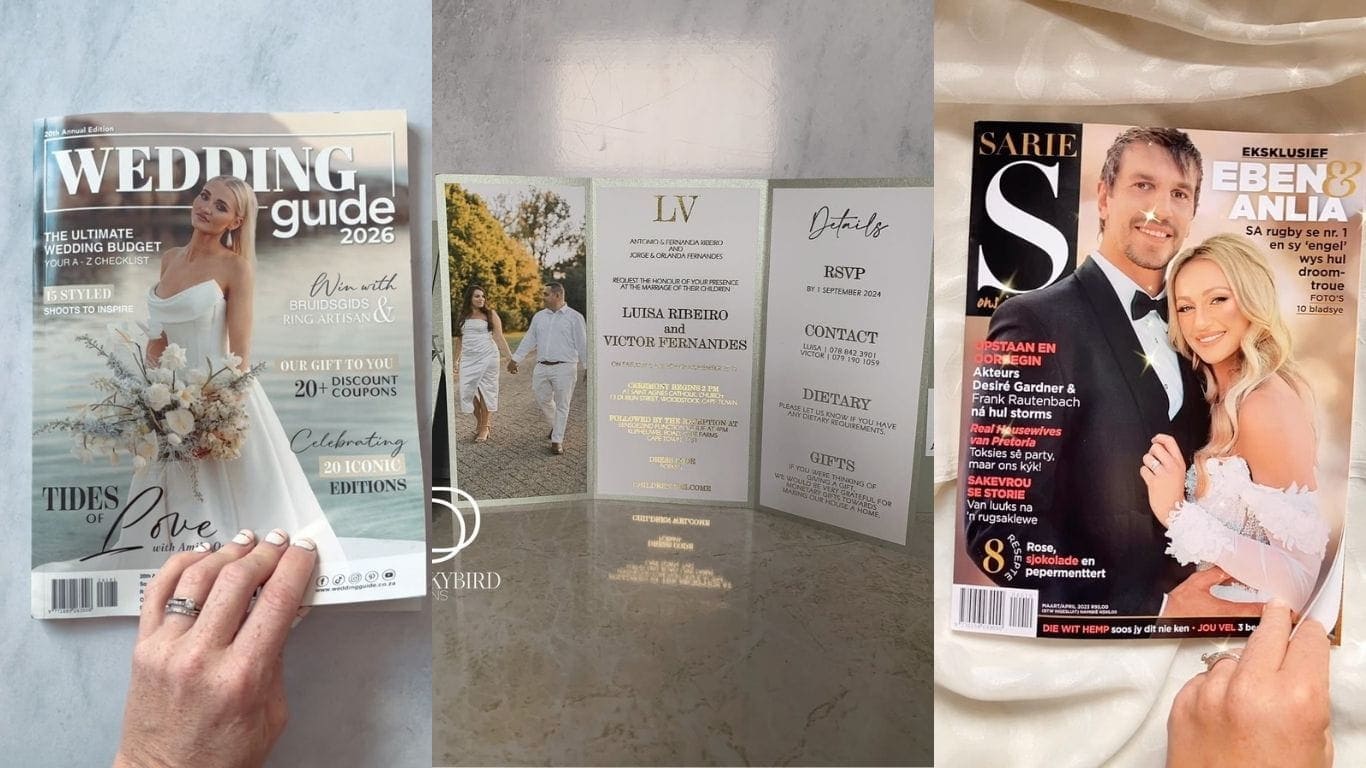South Africa is a destination for the perfect wedding ceremony. Insights into the dos and don’ts of wedding etiquette specific to SA.
In the rainbow-hued landscape of South Africa, where love stories unfold against a backdrop of diverse cultures and breathtaking landscapes, the sanctity of matrimony is celebrated with unparalleled grace and charm.
A South African wedding, an exquisite tapestry of traditions and modernity, is not merely a union of hearts but a harmonious symphony of customs and etiquette. As couples embark on this enchanting journey, a profound understanding of South African wedding etiquette becomes essential to ensure that their special day is not only memorable but also culturally respectful.
This comprehensive guide unveils the intricacies of South African wedding etiquette, providing insights into the dos and don’ts that go beyond the conventional norms. From the vibrant rituals of various cultural communities to the nuances of modern ceremonies, this exploration is a testament to the richness and diversity that define weddings in South Africa.

A Comprehensive Guide to South African Wedding Etiquette
1. Cultural Sensitivity and Diversity
In a country known for its kaleidoscope of cultures, a crucial element of South African wedding etiquette revolves around cultural sensitivity. When planning a wedding, it’s essential to respect and acknowledge the diverse traditions that may be present within families or between the couple themselves. Understanding the nuances of various customs, whether it be the vibrant Zulu ceremonies, the colorful Cape Malay traditions, or the solemnity of a Sotho wedding, lays the foundation for an inclusive and harmonious celebration.
2. Invitations and RSVPs
The process of extending invitations and managing RSVPs is a delicate dance in the realm of wedding etiquette. In South Africa, sending out invitations well in advance is customary, allowing guests to make the necessary arrangements. It’s important to communicate whether the invitation includes a “plus one” or is for the invitee alone. Promptly responding to RSVPs is equally crucial, enabling the couple to finalize catering and other logistical details.
3. Dress Code Awareness
South African weddings often showcase an array of dazzling traditional attire, reflecting the rich cultural heritage of the couple. Guests should be aware of the specified dress code, whether it’s a formal affair or incorporates cultural elements. Additionally, avoiding white attire that might overshadow the bridal party is a sign of respect for the couple’s spotlight moment.
4. Gift-Giving Etiquette
The tradition of gift-giving is deeply ingrained in South African wedding customs. It is customary for guests to bring a gift for the newlyweds, and the type of gift may vary based on cultural influences. Monetary gifts are often placed in an envelope and handed to the couple during the reception, while others may prefer physical gifts. Being attuned to the couple’s preferences and cultural background ensures a thoughtful and respectful gesture.
5. Punctuality Matters
Punctuality is a virtue highly regarded in South African culture, and this extends to wedding ceremonies and celebrations. Guests are expected to arrive on time, and delaying the start of the ceremony can be considered impolite. Couples should also strive to adhere to the agreed-upon schedule to show respect for the time of their guests.
6. Photography and Social Media Etiquette
In the age of smartphones and social media, capturing and sharing moments from a wedding has become commonplace. However, it is essential to exercise discretion and respect the couple’s wishes regarding photography and social media sharing. Some couples may opt for an unplugged ceremony, where guests are requested to refrain from taking photos during specific moments to ensure an intimate and distraction-free atmosphere.
7. Seating Arrangements and Family Dynamics
Careful consideration of seating arrangements is a nuanced aspect of South African wedding etiquette. Understanding family dynamics, hierarchies, and potential sensitivities is crucial when planning the seating chart. Thoughtful placement can enhance the overall atmosphere and ensure that all guests feel comfortable and included.
8. Participation in Rituals
Many South African weddings involve unique cultural rituals and ceremonies that contribute to the overall experience. Guests are encouraged to participate respectfully, whether it’s by joining in traditional dances, partaking in symbolic gestures, or simply observing with reverence. Understanding the significance of these rituals adds depth to the guest experience.
9. Respecting Religious Traditions
South Africa is a melting pot of religious diversity, and weddings often incorporate religious ceremonies. Guests should familiarize themselves with the specific customs and traditions associated with the couple’s faith and participate with respect. Observing the appropriate decorum during religious ceremonies is a sign of cultural understanding and consideration.
10. Expressing Gratitude
Gratitude is a cornerstone of South African wedding etiquette. From the couple expressing appreciation for the presence of their guests to the guests extending thanks for the invitation and hospitality, acknowledging the role each person plays in the celebration fosters a sense of shared joy and camaraderie.

Dos and Don’ts of South African Weddings
The dos and don’ts of a wedding ceremony encompass a set of guidelines and expectations designed to ensure that the event unfolds smoothly, joyfully, and respectfully.
The dos involve positive actions and behaviors that contribute to the harmonious atmosphere of the ceremony. These include adhering to the specified dress code, participating actively in rituals and traditions, offering heartfelt blessings, and being punctual. Embracing cultural practices, expressing gratitude, and engaging respectfully with the couple’s choices are also key dos.
On the other hand, the don’ts highlight behaviors or actions that may disrupt the solemnity or joy of the ceremony. Avoiding insensitive or inappropriate speeches, refraining from criticizing venue choices, and steering clear of disruptive behavior during rituals are among the don’ts. Additionally, guests should be mindful not to ignore cultural dress codes, disrespect elders, or neglect their RSVP responsibilities.
By understanding and adhering to these dos and don’ts, guests contribute to creating a memorable and culturally sensitive wedding ceremony that reflects the couple’s vision and traditions.
Below, JanaTribe has gathered some brilliant South African wedding codes, including the right customs and things not to do as a wedding couple, guests, and even families present at the function.
1. Venue Choices
Do: Express admiration for the chosen wedding venue. Whether it’s a picturesque outdoor setting or a culturally significant indoor space, acknowledge the thoughtfulness behind the venue selection.
Don’t: Critique or express dissatisfaction with the chosen venue. Recognize that the couple likely selected a location that holds personal or cultural significance to them.
2. Timely RSVPs
Do: Respond to wedding invitations promptly, adhering to the specified RSVP date. This helps the couple finalize arrangements and ensures a smoother planning process.
Don’t: Ignore the RSVP date on the invitation. Late responses can disrupt the couple’s planning and create unnecessary challenges.
3. Punctuality
Do: Arrive on time for both the ceremony and reception. Punctuality is highly valued in South African culture, and guests are expected to respect the schedule.
Don’t: Arrive late for the ceremony or reception. Punctuality is a sign of respect, and tardiness can disrupt the flow of the event.
4. Considerate Seating Arrangements
Do: Thoughtfully consider family dynamics and relationships when planning seating arrangements. Strive to create an inclusive and comfortable atmosphere for all guests.
Don’t: Ignore family dynamics when planning seating arrangements. Avoid creating uncomfortable situations by placing individuals with strained relationships too close to each other.
5. Cultural Dress Code
Do: Adhere to cultural dress codes with respect and enthusiasm. If the wedding involves specific traditional attire, such as traditional garments or accessories, make an effort to dress appropriately, showcasing your appreciation for the couple’s cultural heritage.
Don’t: Ignore or disregard cultural dress codes by wearing attire that goes against the specified dress code or may be culturally insensitive. Dressing inappropriately may be seen as disrespectful or insensitive to the couple’s heritage.
6. Ceremony Participation
Do: Participate wholeheartedly in the wedding ceremony, whether it’s a religious service or a cultural ritual. Respectful engagement demonstrates your enthusiasm and support for the couple.
Don’t: Display ignorance about cultural customs. Make an effort to educate yourself beforehand to avoid unintentional faux pas and to appreciate the significance of each ritual.
7. Acknowledging Elders
Do: Show respect to elders present at the wedding. Greet them with a traditional salutation or gesture, demonstrating reverence for the wisdom and experience they bring to the celebration. Be mindful of seating arrangements and ensure that elders are accorded the honor they deserve.
Don’t: Ignore or dismiss the presence of elders. Take the time to greet them respectfully and acknowledge their role in the celebration.
8. Multilingual Celebrations
Do: Embrace the diversity of languages that may be spoken during the celebration. If the wedding involves multiple languages, appreciate the beauty of linguistic diversity and be open to different cultural expressions.
Don’t: Resist or express discomfort with the use of multiple languages. Embrace linguistic diversity, and if possible, learn a few basic phrases to express goodwill.
9. Respecting Cultural Traditions
Do: Embrace, participate, and respect the diverse cultural traditions present in South Africa. Learn about the customs of the couple and their families and show appreciation for the richness of these traditions.
Don’t: Disregard or mock cultural traditions. Be open-minded and show genuine interest in learning about and participating in the customs of the wedding even if they’re unfamiliar.
10. Engagement with Wedding Tradition and Rituals
Do: Engage respectfully in any traditional ceremonies that may be part of the wedding festivities. Participate in dances, rituals, symbolic gestures, observance, or customs to show appreciation for the couple’s cultural background. Understanding and appreciating these traditions enhances the overall experience.
Don’t: Disregard religious customs or treat them with indifference. Even if the ceremony is not of your faith, show respect for the beliefs and practices of the couple. Avoid inappropriate behavior that may disrespect the sanctity of these moments.
11. Adherence to Cultural Blessings
Do: Be attentive and respectful during cultural blessings or prayers. Even if they may be unfamiliar, observe quietly and reflect on the significance of these moments.
Don’t: Engage in disruptive behavior during cultural or religious rituals. Maintain decorum and attentiveness during these significant moments.
11. Legal Compliance
Do: Ensure legal compliance by following South African marriage laws and requirements. Familiarize yourself with the necessary documentation and processes to contribute to the smooth execution of the legal aspects of the wedding.
Don’t: Neglect the legal requirements of the wedding. Failure to comply with South African marriage laws may lead to complications and legal issues for the couple.
12. Registry Engagement
Do: Initiate your marriage registry early, offering diverse gift options, maintaining regular updates, and expressing gratitude.
Don’t: Avoid excessive limitations, neglecting monitoring, being overly specific, overlooking thank-you gestures, and underestimating the convenience of online options.
13. Marriage Certificate Acknowledgment
Do: Acknowledge the significance of the marriage certificate. Understand that this legal document symbolizes the formal union and is an essential part of the couple’s journey.
Don’t: Minimize the importance of the marriage certificate. Understand that it holds legal significance and is an integral part of the marriage process.
14. Photography Courtesy
Do: Respect the couple’s wishes regarding photography and social media sharing. If the couple prefers an unplugged ceremony, avoid taking photos during specific moments to maintain an intimate atmosphere.
Don’t: Disregard the couple’s photography guidelines. If they request an unplugged ceremony, respect their wishes to maintain the intended atmosphere. Don’t intrude on personal or sacred moments with intrusive photography. Respect the privacy of the couple and their families during intimate ceremonies.
15. Couple Blessings and Well-Wishes
Do: Offer sincere blessings and well-wishes to the couple. Whether through a traditional blessing, a heartfelt note, or a symbolic gesture, convey your genuine hopes for their future.
Don’t: Offer blessings that may be deemed insensitive or inappropriate. Be mindful of the couple’s beliefs and avoid imposing personal views.
16. Gifts with Cultural Significance:
Do: Bring a thoughtful gift for the newlyweds, respecting their cultural background and preferences. Monetary gifts are often given in envelopes, and physical gifts should align with the couple’s registry or preferences. Handcrafted traditional items or symbolic gifts can add a personal touch to your present.
Don’t: Give gifts that may be considered inappropriate or offensive. Be cautious not to choose items or symbols from a culture that you do not fully understand or have a connection to, as this can be disrespectful and insensitive. Instead, opt for gifts that align with the couple’s cultural background or seek guidance from them or their registry to ensure your choice is culturally respectful.
17. Supporting Local Artists and Crafts
Do: If selecting gifts or decorations, consider supporting local artists and craftsmen. This not only adds a unique touch to the celebration but also contributes to the local community.
Don’t: Make negative comments about local artistry or craftsmanship. Appreciate the unique creations and the effort that goes into preserving cultural heritage.
18. Cultural Foods
Do: Be open to trying traditional foods served during the wedding celebrations. Graciously accepting and enjoying these dishes is a wonderful way to show appreciation for the culinary heritage of the couple.
Don’t: Reject or disparage traditional foods served at the wedding. Approach the culinary experience with an open mind, and savor the flavors offered.
19. Thoughtful Wedding Speeches
Do: Prepare thoughtful and culturally sensitive speeches. Acknowledge the significance of the day, express gratitude, and share anecdotes that align with the couple’s cultural background.
Don’t: Deliver speeches that may be insensitive to cultural or religious beliefs. Avoid humor or anecdotes that could be misinterpreted or offensive.
20. Expressing Gratitude
Do: Express gratitude for the invitation and hospitality. Thank the couple for including you in their celebration, and consider sending a thank-you note or message after the wedding.
Don’t: Fail to express gratitude for the invitation and hospitality. A lack of acknowledgment may be perceived as indifference or ingratitude.
Conclusion
As South African weddings continue to captivate with their fusion of cultural vibrancy and contemporary elegance, mastering the art of wedding etiquette becomes a key element of the celebration.
The dos and don’ts outlined in this guide serve as a compass, guiding couples and guests through the intricacies of respectful and culturally aware behavior. By adhering to these principles or rules and regulations, each South African wedding becomes not only a union of hearts but a symphony of shared understanding and mutual respect, elevating the joyous occasion to unparalleled heights.







